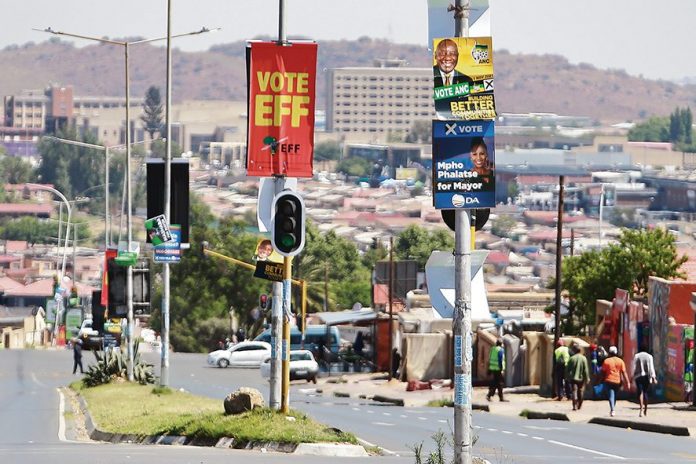
Johannesburg – I wouldn’t blame anyone for feeling disorientated by the explosion of election manifestos and political innuendo.
More than 200 registered political parties have unleashed an army of no less than 65 000 candidate councillors on us. Everywhere we go, we are besieged by posters and imposters bearing tall and sometimes crude promises.
The rapid and furious deployment of an insane amount of promises appears to be the unspoken campaign strategy of the 2021 local government elections.
[membership level=”1″]This strategy, it is hoped, will make the weary and wary voters dizzy and numb – wiping out all memories of recent municipal misgovernance, causing them to sleepwalk to the nearest of the 23 151 voting stations to vote the same way they did last time.
All you who wish to read between and behind the lines of the recently unveiled political manifestos, please lend me your ears. Consider me your free-mahala election tour guide.
Hold my hand as we wade through the rivers of sewage, jumping over the potholes and evading the illegal electrical power connections. Would you rather fly over the more scenic routes of the land?
Still, I would insist that we stop in Durban so I introduce you to one of our newest and youngest ancestors – five-year-old Elihle Nyembe.
She died on Tuesday, August 31, 2021. She fell into one of the 3 000 pit latrines in our schools and crèches nationally.
Pity, Elihle did not live to see the elimination of pit latrines in 2022, as promised solemnly by veteran Minister Angie Motshekga in parliament.
Come with me to urban South Africa where the 3.6-million youth who are unemployable, uneducated, and untrained – the so-called NEETS – are vegetating.
To understand the causes of these ghastly scenes and sins, we need to engage the other manifesto, which they hope you will not read.
I am speaking of the auditor-general’s (AG) Consolidated General Report on the Local Government Audit Outcomes 2019-20. Its findings and recommendations are, among other things, intended to “serve as a good basis for the incoming administration” – which we are about to usher in on November 1. We can only ignore this report at our own peril.
The report connects the dots between “the poor state of financial and performance management” in municipalities and their inability “to deliver on their mandate”.
It also spells out why, out of the 257 municipalities in the land, “the financial position of just over a quarter is so dire that there is significant doubt that they will be able to continue operating as a going concern in the near future”.
Nearly 90% of the municipalities do not comply with the relevant pieces of financial management legislation, resulting in many qualified, adverse, and disclaimed audit findings.
The report suggests that “most municipalities are now in a worse position than [they were] at the beginning of this administration’s term in 2016-2017”.
Indeed, many municipalities have been unwilling and unable to provide acceptable financial accounts despite repeated admonitions and recommendations. And yet, in the period under review, municipalities have paid “the hefty price tag at just over R5-billion” to ineffectual financial consultants. Many of the same and unrepentant coucillors who oversaw the rot are being fielded for possible re-election.
Voters should refuse to aid and abet the ongoing slide towards municipal kakistocracy.
With a salary bill of R74-billion and debts of R12-billion and R8-billion to Eskom and the water boards, respectively, “municipalities prioritise the payment of salaries and councillor remuneration above all else.
At R2.25-billion, the Tshwane metro took the cup in unauthorised expenditure. They came second only to Emalahleni in the fruitless and wasteful expenditure stakes. The total amounts illegally and unethically paid to (a) other state officials, (b) employees including councillors, and (c) to close family members of employees in this period, amount to R3.6-million, R19-million, and R527-million, respectively. Here is my plea: before you go to vote, slowly crumple up the glossy manifesto document of your preferred party, until it is as soft as toilet paper, and then tear it up. Read the AG’s report instead. After that, you can go and vote away.
• Professor Maluleke is a senior research fellow at the University of Pretoria Centre for the Advancement of Scholarship. Follow him on Twitter @ProfTinyiko
Follow @SundayWorldZA on Twitter and @sundayworldza on Instagram, or like our Facebook Page, Sunday World, by clicking here for the latest breaking news in South Africa. To Subscribe to Sunday World, click here.
Sunday World
[/membership] [pmpro_signup submit_button=”Register” level=”1″ login=”1″ redirect=”referrer” short=”false” title=”Register to view Exclusive Content” short=”true” custom_fields=”true”]


